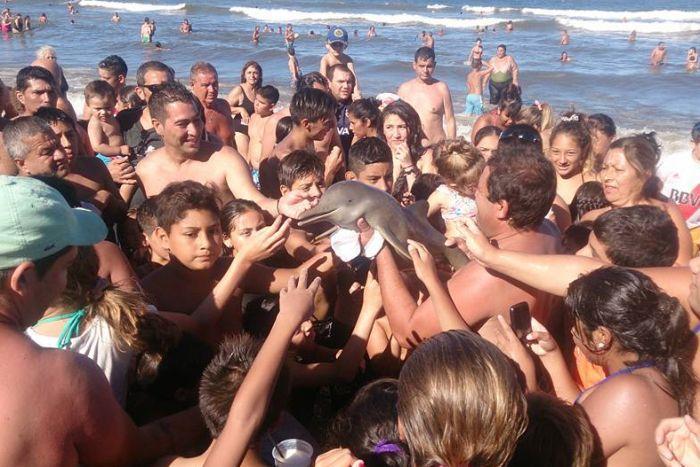Did a group of photo-taking tourists really kill an endangered dolphin in Argentina?
Tourists at a beach in Argentina crowd around a young Franciscan dolphin that was later left dead on the sand.
The photo above has been circulating in some international media, presented as an ugly display of humans' obsession with photographing and posting everything to social media.
It's a mass of tourists in Santa Teresita, a beach town in a Buenos Aires province, crowding around a man holding a young Franciscan dolphin for others to pet and take pictures of.
The dolphin was later found dead on the shore.
The Buenos Aires blog Infozona first posted about the incident, berating the tourists for killing the animal, which is one of an estimated 30,000 Franciscan dolphins along that province's coast.
The story caught the attention of several tabloids that have attributed the dolphin's death to the tourists' manhandling. One caption read, "The dolphin was passed around like an object."
But Argentine newspaper El Clarín reported the country's Fundación Mundo Marino said in a statement it wasn't clear whether the dolphin was alive when tourists found it.
Infozona later shared this YouTube video. At around the 1:15 mark a woman says "We have to put it back in the water!" and a man says "It's dead! It's dead!"
But even at the start of the clip, some four men examine the mammal, arguing "it's dead," or "it's dying." Then they carry it out of the water, and the horde forms.
oembed://https%3A//www.youtube.com/watch%3Fv%3DGUydujl3NNc
Despite the aparent cause, the dolphin's death elicited outrage from readers and a statement from Argentina's Fundación Vida Silvestre, an environmental group, says two of the animals were picked up, and at least one died.
Franciscan dolphins live exclusively in Argentina, Uruguay and Brazil. They're small, growing to no more than five feet in length. The foundation says they're a species vulnerable to extinction.
If the calf in Santa Teresita was dead when the tourists found it, then they didn't kill it. But even so, they'd have been petting and photographing a dead wild animal.
In response to the incident, Vida Silvestre has started this campaign, encouraging people to stay away from the fragile species.
We want to hear your feedback so we can keep improving our website, theworld.org. Please fill out this quick survey and let us know your thoughts (your answers will be anonymous). Thanks for your time!
